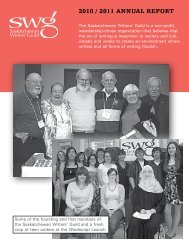Windscript Volume 24, 2007-2008 - Saskatchewan Writers' Guild
Windscript Volume 24, 2007-2008 - Saskatchewan Writers' Guild
Windscript Volume 24, 2007-2008 - Saskatchewan Writers' Guild
You also want an ePaper? Increase the reach of your titles
YUMPU automatically turns print PDFs into web optimized ePapers that Google loves.
The Magazine of <strong>Saskatchewan</strong> High School Writing poetry<br />
17 for life: A foreword by Jennifer Still<br />
Poetry is about possibilities, about saying what normally<br />
eludes words, definition. It’s about pinning down that<br />
which is fleeting, bursting open the minutiae into myriad<br />
worlds. If this was 17 years earlier, I would be sitting down<br />
at my PC 286 (floppy-disk drive) in my basement bedroom,<br />
scented candles lit and flickering, the green DOS cursor<br />
(yes, DOS!) pulsing the 14” monitor, blinkblinkblink. I’d<br />
be writing about my recent break-up, my fight with my<br />
parents, the desperate poverty of the world. I would be<br />
holding close the words of my high school teacher (keep<br />
writing, you have talent) and listening to a voice that is<br />
simultaneously the loudest and quietest part of myself, the<br />
most genuine and the most hidden.<br />
A friend recently told me how she is eternally 17. I agree<br />
with her. There is a fearless, hopeful, ambitious part of ourselves<br />
that remains this youthful being filled with potential.<br />
It is that time when we are just beginning to figure out<br />
who we are, or, as Ceara Caton so aptly writes, when we<br />
are “waiting for (our) perfect picture.” And despite the<br />
fact I needed Wikipedia to enlighten me on the meanings<br />
of such terms as “emo hair” (with thanks to Ben Whittaker,<br />
and for those who are no longer 17, this is a style<br />
that is “emotional, sensitive, shy, introverted or angsty”),<br />
in reading the submissions I was instantly 17 again, connecting<br />
in a very present way to themes of loss, identity,<br />
suicide, poverty, bullying, relationships, drug abuse, family.<br />
And as I sunk into the work and worlds that connected so<br />
deeply with my youth and early risks as a writer, I realized<br />
it is not so much an age that places these young voices as<br />
it is an immediacy, an experience, a presence that is less<br />
reflection and intention as it is desire and action. As serious<br />
and grim as much of the content is, the poems remain<br />
rich with life, with hope, with the experienced voices of<br />
those deeply in the presence of this particular moment.<br />
It is these first wadings into language that will feed the<br />
work, in some form, for the rest of their lives. It was an<br />
absolute thrill to read this work and to engage in discussion<br />
with these writers who not only have the talent, but<br />
the dedication, the curiousity, and the bravery to listen to<br />
their voices and address their deepest concerns through<br />
words. It is such a gift to have a venue for these original,<br />
stunningly aware and imaginitive voices. Thank you to the<br />
<strong>Saskatchewan</strong> Writers <strong>Guild</strong> for providing the stage that is<br />
windScript, an immensely important publication.<br />
A special congratulations must go to Arden Angley,<br />
winner of the Jerrett Enns Award for Poetry, and Jocelyn<br />
Lukan, winner of the Currie-Hyland Prize. Arden’s<br />
poem “Your woman, soft and small” immediately struck<br />
me for its incredible imagination and arresting imagery.<br />
Arden’s navigation through landscapes such as “She<br />
paddled her rowboat in the gaps of your gums, waved<br />
to your childhood before it was swallowed” instantly<br />
broke language into new possibilities for me. Arden’s<br />
intuitive approach to writing, combined with her deft<br />
sense of language, narrative, and dialogue is very much<br />
at work in the poems published here. And Jocelyn<br />
Lukan’s suite of poetry has the efficiency and efficacy<br />
so desired in poetry. From the subtle suggested metaphor<br />
of “smoke billow ascends up / smoothstretched /<br />
<strong>Saskatchewan</strong> skies // I sprinkle your ashes / upon taut<br />
forehead flesh” to the sharp and gut-punching directness<br />
of “naïve candy virgin / waiting / waiting / waiting<br />
to be”, Jocelyn transposes the ephemeral with the particular,<br />
the particular with the ephemeral in a language<br />
that is as resonant as it is focused, as reaching as it is<br />
grounded.<br />
And finally, congratulations to everyone who took the<br />
risk of putting their concerns, their observations, their<br />
passions into words. The stack of poetry I received<br />
was enormous. Hundreds of poems were whittled into<br />
various piles and various piles into yet smaller piles<br />
that became, eventually, a handful of poems. The subjectivity<br />
involved in selection is inevitable. I read for<br />
surprise, for music, for originality. I looked for an image<br />
that challenged me, a subject that evoked, a music that<br />
lifted. So thank you all for some fine reading this fall.<br />
It was no small job to make the final selections. The<br />
work published here, though varied in tone and content,<br />
shares a common attempt to say the unsayable,<br />
to place the world, if only momentarily, into a tangible,<br />
clarified state. On behalf of windScript and all the readers,<br />
for your words, I thank you.<br />
Poetry Editor<br />
Jennifer Still<br />
windScript volume <strong>24</strong><br />
3<br />
Jennifer Still




